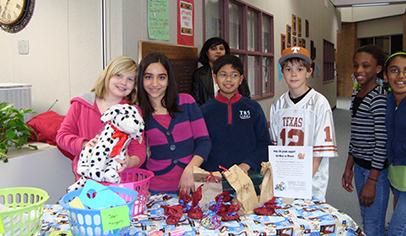Cool Enrichment Ideas for PTOs

Try one (or all!) of these parent-group-tested ideas to make learning more exciting for kids.
Careful, that trash might just be treasure! Have students create art projects and sculptures using donated, recycled, and found materials. You can follow a theme that ties to the curriculum or leave it completely open to the imagination.
Set up a literacy campout on the front lawn of the school. Families bring tents and camping chairs for an afternoon or evening of reading together. It’s an especially great way to get everyone in the mood for summer reading; work with teachers to highlight books that are on their reading lists.
Join the PTO Today community (it's free) for access to resources, giveaways and more
Run a book swap, a book drive, or both together. Parents and kids donate gently used books for their own school library or for a school in need. For every two books they bring, they can choose one new-to-them book to take home.
Liven up your next reading event with a book character parade! Students dress up as their favorite fictional (or historical) character. Hold the parade at the beginning of the event. Or drum up publicity for the event by having kids come to school in costume earlier that day.
Have you visited a local museum lately? Science centers, children’s museums, and aquariums often have extra educational services available for school groups, ranging from study materials to private tours with a docent. Sometimes they’re even offered free of charge.
Older students often get a kick out of mentoring the younger kids. Ask middle or high schoolers who are involved in math, chess, or other clubs to help run an exploratory afternoon or even occasional after-school meetings.
A STEM event is a great way to help boost student learning in the areas of science, technology, engineering, and math. Our free Guide to Supporting STEM Learning for PTOs and PTAs can help you plan a fun and educational STEM event.
Reading out loud is a great way to practice, but kids can feel self-conscious doing so with their peers or parents. Instead, find a local animal shelter or service dog training center and ask whether they would partner with the school so that students can read to the animals.
Bingo is a great way to practice key skills in a number of areas. For vocabulary, reading, and spelling, make game boards with words on them. For math, have the caller share an equation; players must calculate the answer to figure out which number their marker should cover. For social studies or history, put important dates or names on the boards, with the caller sharing a description of a key event or place or a person’s accomplishments.
There are probably many artistically talented parents at your school; do a survey to find out whether any of them (or their family members) would be willing to share their skills at an art and music appreciation day. Alternatively, contact the art, dance, drama, or music departments at a local college to find out whether faculty and students would run a workshop for the school.
To get students even more excited about reading, the Meadowbrook Farms Elementary PTG in East Greenwich, R.I., held a weeklong reading program. Each day featured a different fun event, and the week was capped off with a night where they could “experiment with a new book.” Volunteers wore lab coats, and tables were set up with science fair boards that described different children’s book series.
Working with teachers, the Walker Station Elementary PTO in Sugar Land, Texas, got 5th graders wildly interested in animals and science with its “All Creatures Big and Small” project. The students learned about cats, dogs, and more exotic animals through a rigorous science curriculum. Then they completed 50 hours of volunteer work as part of a service learning component, including baking dog biscuits, collecting pet food, and raising money for the local zoo’s adopt an animal program.






















